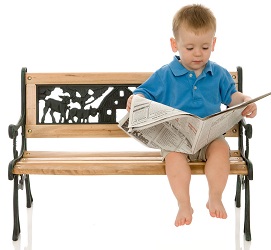Reading for fun has serious effects
 A new study has suggested students who read for pleasure are heading for much higher marks than their peers.
A new study has suggested students who read for pleasure are heading for much higher marks than their peers.
A new paper from the British Centre for Longitudinal Studies’ Institute of Education says kids with the reading bug made more progress in maths, vocabulary and spelling between the ages of 10 and 16 than those who chose not to pick up a book.
Research was conducted by Dr Alice Sullivan and Matt Brown, who analysed the reading behaviour of approximately 6,000 young people in a previous study, this time comparing how often the teenagers read during childhood and their test results in maths, vocabulary and spelling at ages 5, 10 and 16.
The report finds that reading for pleasure is more important for children’s cognitive development in the teenage years than their parents’ level of education. The combined effect at 16 of reading books often, going to the library regularly and reading newspapers is four times greater than the statistical advantage gained from having a parent with a degree.
Researcher and author Dr Sullivan said reading had a significant effect on non-verbal skills too: “It may seem surprising that reading for pleasure would help to improve children’s maths scores,” she said, “but it is likely that strong reading ability will enable children to absorb and understand new information and affect their attainment in all subjects.”
The scientists say new technology is no excuse for missing pleasure of the written word.
“There are concerns that young people’s reading for pleasure has declined. There could be various reasons for this, including more time spent in organised activities, more homework, and of course more time spent online,” Dr Sullivan said.
“However, new technologies, such as e-readers, can offer easy access to books and newspapers and it is important that government policies support and encourage children’s reading, particularly in their teenage years.”








 Print
Print